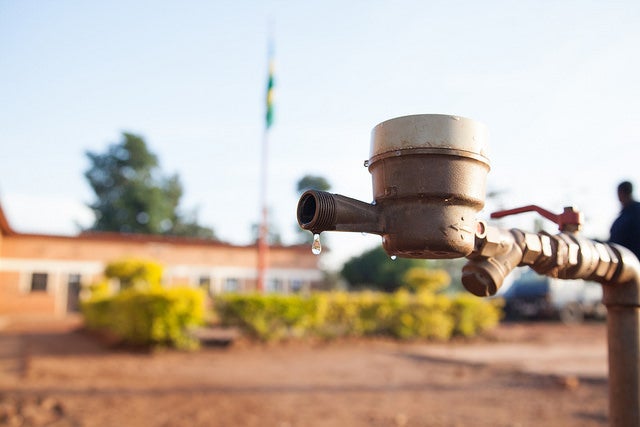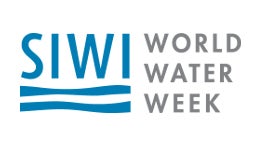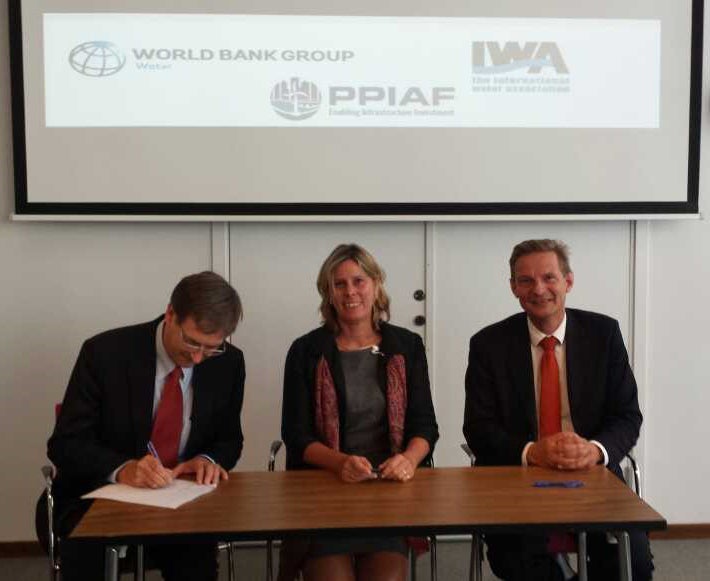
Photo credit: A'Melody Lee / World Bank
Also available in 中文
In developing countries, roughly 45 million cubic meters of water are lost daily with an economic value of over US$3 billion per year.
A World Bank study puts the global estimate of physical water losses at 32 billion cubic meters each year , half of which occurs in developing countries. Water utilities suffer from the huge financial costs of treating and pumping water only to see it leak back into the ground, and the lost revenues from water that could have otherwise been sold. If the water losses in developing countries could be halved, the saved water would be enough to supply around 90 million people.
We refer to it as non-revenue water (NRW), or water that is pumped and then lost or unaccounted for.
The need to manage NRW better and protect precious water resources has become increasingly important. Non-revenue water (NRW) management allows utilities to expand and improve service , enhance financial performance, make cities more attractive, increase climate resilience and reduce energy consumption.
In a water constrained environment, NRW management often offers superior cost-effectiveness compared to supply augmentation. At the same time, revenues from saved water improve a service providers’ bottom line whilst lower water abstraction increases city resilience.
But the benefits that arise from reducing NRW are yet to become driving forces behind tackling this endemic challenge in developing countries. Despite the benefits and decades of training and advocacy from international and industry organizations, NRW reduction still receives scant attention amongst those utilities which would most benefit from it – why is that?
Reasons for utilities not making progress include weak capacity, lack of incentives, poor financial discipline and the effort required to find and fix leaks compared to building new treatment facilities. This has created a lethargy which is now being shaken by pressures coming from climate change, water scarcity and increasing expectations of consumers.

The workshop, and a more formal partnership with IWA is part of a broader initiative within the World Bank Water Global Practice to help build sustainable urban utilities. This initiative is supported with funds from PPIAF and is focused on how to increase the use of Performance Based Contracting (PBC) as one way to address high levels of leakage.
Through PBCs, utilities can access the capacity and equipment that they lack – and with payments based on results the incentives to perform are high and the risk of non-performance by the contractor is reduced. A World Bank financed project in Ho Chi Minh City used a NRW PBC approach in a part of the city and saved half of the water that was previously being lost to leakage – 100,000m3/day (enough water to serve 500,000 people). A truly remarkable achievement which set a new benchmark for the NRW PBC model!
With the proof of concept now a given, the challenge is how to streamline and simplify the NRW PBC project preparation and contracting process. The World Bank and IWA are working together in collaboration with the IDB to advocate for the reduction of NRW and create more dynamic markets at national and international levels. Already we are working with several potential clients in all regions to introduce NRW PBC contracts as part of a program to improve the performance and sustainability of utilities.
For more information on this initiative, contact Gerard Soppe ( gsoppe@worldbank.org ) or Jema Sy ( jsy@worldbank.org ).
Related link:
The World Bank and the International Water Association to Establish a Partnership to Reduce Water Losses

and Ger Bergkamp, Executive Director of IWA (right) signing
the statement of intent. Photo credit: Nishtha Mehta / World Bank




Join the Conversation